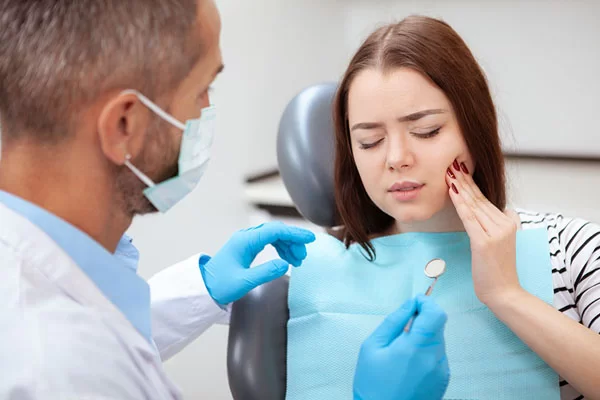Recognizing the Signs of TMJ Dysfunction
The temporomandibular joint (TMJ)is essential for jaw movement, connecting your lower jaw to your skull. When this joint experiences dysfunction, it can lead to a condition known as temporomandibular joint disorder(TMD). These disorders often cause chronic discomfort and interfere with daily activities like eating or speaking.
If you’re in Wilmington or Seaford, DE, and experiencing symptoms of TMJ disorder, it’s important to seek professional evaluation and treatment at Brown and Baran Family Dentistryto prevent worsening symptoms. Contact our Wilmington dental office at (302) 999-7600or our Seaford dental office at (302) 536-7589to schedule a TMJ evaluation.
Symptoms of TMJ Disorders
1. Jaw Pain and Tenderness
Persistent jaw pain or tenderness around the jaw jointis a hallmark symptom of temporomandibular joint dysfunction. This discomfort may worsen when chewing, yawning, or speaking and can extend to the neck, shoulders, or facial muscles.
2. Clicking or Popping Sounds
Hearing clicking, popping, or grating soundswhile opening or closing your mouth may indicate that the TMJ disc is misaligned. Although not always painful, this symptom often accompanies other issues like restricted jaw movement.
3. Limited Jaw Movement
Difficulty opening or closing your mouth fullyis a common complaint among individuals with TMJ disorders. In severe cases, jaw stiffness may prevent opening your mouth more than a few millimeters.
4. Jaw Locking
Episodes where the jaw becomes lockedin an open or closed position are indicative of advanced TMJ disorders. This condition may require immediate attention from a dentist or oral surgeon.
5. Headaches and Migraines
TMJ disorders often trigger headaches, particularly around the temples or behind the eyes. These headaches can mimic migrainesand may include additional symptoms like ear pain or dizziness.
6. Toothaches and Bruxism
TMJ-related toothachesare often mistaken for dental problems. Bruxism(teeth grinding or clenching) can exacerbate jaw pain and contribute to enamel wear, further complicating TMJ issues.
7. Tinnitus and Ear Pain
TMD can cause tinnitus(ringing or buzzing in the ears) due to the close proximity of the TMJ to ear structures. Ear painwithout an infection is another possible symptom.
8. Facial, Neck, and Shoulder Pain
Painradiating from the jaw joint to the cheeks, temples, neck, or shouldersis another indicator of TMJ dysfunction. Muscle tension in these areas often accompanies chronic TMJ issues.
Do Different TMJ Disorders Cause Different Symptoms?
There are several types of temporomandibular joint disorders, and the symptoms may vary depending on the specific condition. The most common types of TMJ disorders include:
- Myofascial Pain Disorder: Pain and discomfort in the muscles that control jaw movement
- Internal Joint Derangement: Damage to the joint’s disc or ligaments, causing clicking or popping sounds and limited jaw movement
- Degenerative Joint Disease: Arthritis or other conditions that cause damage to the joint, resulting in pain and limited movement
- TMJ Ankylosis: Difficulty opening the mouth, pain or discomfort in the jaw joint, headaches, difficulty chewing or speaking, and facial asymmetry
Who Is at Risk for TMJ Disorders?
Certain habits and conditions can increase your risk of developing TMJ disorders:
- Chronic teeth grinding or clenching (bruxism)
- Jaw injuries or trauma
- Arthritis in the temporomandibular joint
- Poor posture, especially when working at a desk
- Nail biting or excessive gum chewing
When to Seek Treatment for TMD
If you experience persistent jaw pain, limited jaw movement, or frequent headaches, don’t wait to seek help. Early intervention can prevent symptoms from worsening and improve your quality of life. Our Wilmington and Seaford dentists can recommend TMJ treatmentssuch as:
- Non-surgical approaches: Physical therapy, oral splints, and relaxation techniques to relieve TMD symptoms.
- Medications: Nonsteroidal anti-inflammatory drugs (NSAIDs), muscle relaxants, or prescription medications for pain relief.
- Advanced options: TMJ arthroscopy, open joint surgery, or other surgical treatments in severe cases.

Frequently Asked Questions
If you’re experiencing pain or discomfort in your jaw joint or jaw muscles, as well as clicking or popping sounds when you open and close your mouth, you may have TMD. Other symptoms may include difficulty chewing or biting, aching or pain in the face or neck, and swelling on one or both sides of the face. If you’re experiencing these symptoms, seek evaluation and treatment from a doctor.
Yes, TMD can make eating or speaking difficult due to pain, stiffness, or jaw locking. Soft foods and avoiding chewing gum can help alleviate symptoms.
Chronic cluster, migraine, or tension headaches can sometimes be misinterpreted as symptoms of TMJ disorder, primarily due to the fact that TMJ disorder itself can trigger similar headache patterns. Additionally, persistent sinus pain and sinus infections may generate discomfort around the temples, mimicking the sensations associated with TMJ disorder.
Don’t Let Jaw Pain Rule Your Life — Know When to Seek Treatment
Don’t let TMJ pain control your life. If you’re experiencing symptoms of TMD, contact our Wilmington office at (302) 999-7600or our Seaford office at (302) 536-7589to schedule an evaluation. Our experienced dentists will develop a personalized treatment plan to relieve your symptoms and restore jaw function. We proudly serve Wilmington, Seaford, and the surrounding Delaware communities.



